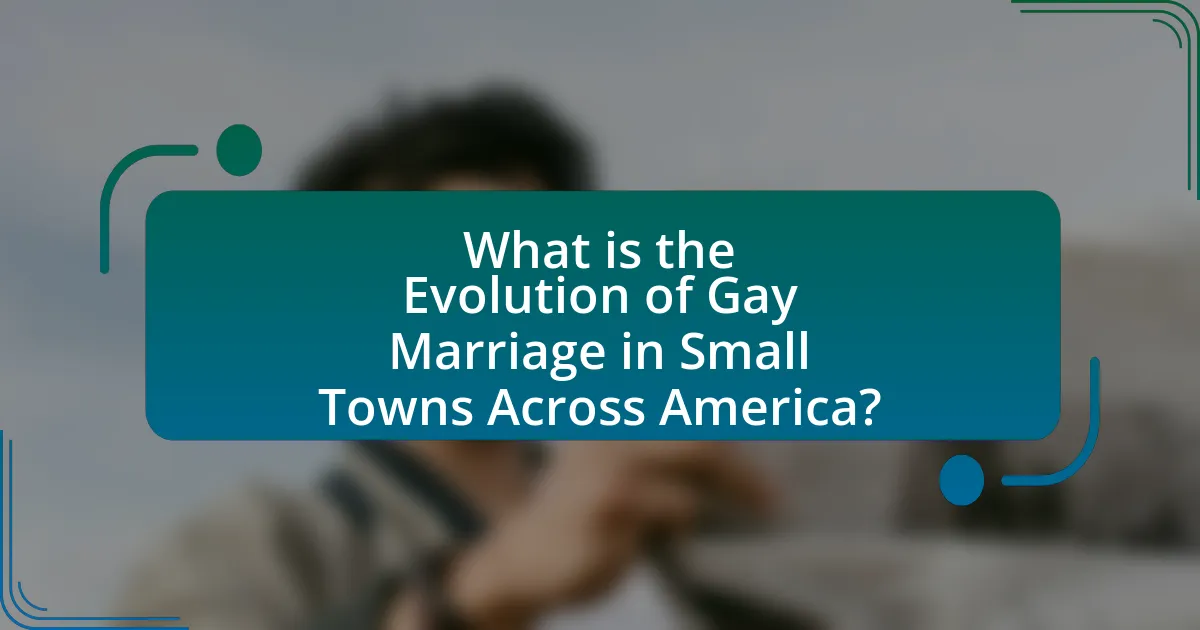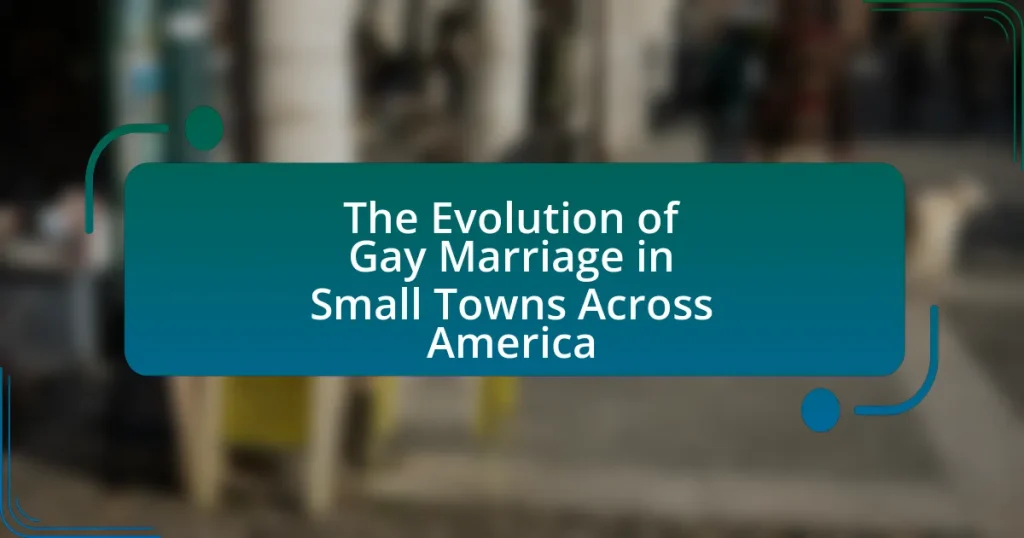The article examines the evolution of gay marriage in small towns across America, highlighting significant changes in public opinion and legal recognition following the Supreme Court’s 2015 ruling in Obergefell v. Hodges. It discusses how historical events, grassroots movements, and cultural factors have influenced acceptance and visibility of LGBTQ+ rights in these communities. The article also addresses the unique challenges small towns face compared to urban areas, the implications of legalizing gay marriage on local economies, and strategies for fostering inclusivity. Overall, it illustrates the shifting attitudes towards gay marriage and the role small towns play in the broader context of marriage equality.

What is the Evolution of Gay Marriage in Small Towns Across America?
The evolution of gay marriage in small towns across America has progressed significantly, particularly following the landmark Supreme Court decision in Obergefell v. Hodges in 2015, which legalized same-sex marriage nationwide. This ruling catalyzed changes in public opinion and acceptance, leading to increased visibility and support for LGBTQ+ rights in smaller communities.
Prior to this, many small towns had limited recognition of same-sex relationships, often influenced by conservative cultural norms. However, as societal attitudes shifted, local governments began to adopt more inclusive policies, and grassroots movements emerged to advocate for equality. For instance, surveys indicate that support for same-sex marriage in rural areas has grown, with a 2020 Gallup poll showing that 67% of Americans, including those in small towns, favor legal recognition of same-sex marriages.
Additionally, local pride events and LGBTQ+ organizations have become more common in small towns, fostering community acceptance and support. The evolution reflects a broader trend of increasing acceptance and legal recognition of LGBTQ+ rights across the United States, demonstrating that even in traditionally conservative areas, attitudes towards gay marriage have evolved positively over time.
How has the perception of gay marriage changed in small towns over time?
The perception of gay marriage in small towns has shifted from widespread opposition to increasing acceptance over time. Initially, many small towns reflected conservative values, leading to significant resistance against gay marriage, often rooted in religious beliefs and traditional family structures. However, as societal attitudes evolved, particularly following landmark legal decisions like the Supreme Court’s ruling in Obergefell v. Hodges in 2015, acceptance grew. Surveys indicate that support for gay marriage in rural areas has risen, with a 2021 Gallup poll showing that 70% of Americans now support same-sex marriage, including a notable increase in rural populations. This change is attributed to greater visibility of LGBTQ+ individuals, advocacy efforts, and generational shifts in attitudes, leading to a more inclusive environment in many small towns.
What historical events influenced the acceptance of gay marriage in these communities?
The acceptance of gay marriage in small towns across America has been significantly influenced by several historical events, including the Stonewall Riots of 1969, which marked a pivotal moment in the LGBTQ+ rights movement, and the subsequent rise of activism that followed. The AIDS crisis in the 1980s also galvanized communities to advocate for LGBTQ+ rights, leading to increased visibility and support. Additionally, the landmark Supreme Court ruling in Obergefell v. Hodges in 2015, which legalized same-sex marriage nationwide, provided a legal framework that further encouraged acceptance at local levels. These events collectively fostered a cultural shift towards greater acceptance of gay marriage in various communities.
How have local attitudes shifted in response to national movements for gay rights?
Local attitudes have increasingly become more supportive of gay rights in response to national movements advocating for equality. This shift is evidenced by the growing acceptance of same-sex marriage, which has been reflected in local legislation and community events celebrating LGBTQ+ pride. For instance, after the Supreme Court’s 2015 ruling in Obergefell v. Hodges, which legalized same-sex marriage nationwide, many small towns reported a rise in local support for LGBTQ+ initiatives, with increased participation in pride parades and local government discussions on anti-discrimination policies. Surveys indicate that public support for same-sex marriage has risen significantly, with a 2021 Gallup poll showing that 70% of Americans approve of same-sex marriage, illustrating a direct correlation between national advocacy and local acceptance.
What role do small towns play in the broader context of gay marriage legalization?
Small towns play a crucial role in the broader context of gay marriage legalization by serving as microcosms of societal attitudes and legal challenges. These communities often reflect a mix of traditional values and progressive change, influencing the acceptance and implementation of gay marriage laws. For instance, small towns can either resist or embrace legalization, impacting local policies and the experiences of LGBTQ+ individuals. Historical data shows that as states legalized gay marriage, small towns often followed suit, demonstrating shifts in public opinion and legal frameworks. This dynamic illustrates how small towns contribute to the national conversation on marriage equality, highlighting the importance of local contexts in the evolution of gay marriage across America.
How do small towns differ from urban areas in their approach to gay marriage?
Small towns generally exhibit more conservative attitudes toward gay marriage compared to urban areas, often influenced by traditional values and community norms. In urban areas, there is typically greater acceptance and legal support for LGBTQ+ rights, reflected in higher rates of same-sex marriage and more progressive policies. For instance, a 2019 study by the Williams Institute found that urban areas had a significantly higher percentage of same-sex couples compared to rural areas, indicating a more supportive environment for gay marriage. Additionally, small towns may face social pressures that discourage open discussions about LGBTQ+ issues, whereas urban settings often foster diverse communities that promote inclusivity and acceptance.
What unique challenges do small towns face regarding the legalization of gay marriage?
Small towns face unique challenges regarding the legalization of gay marriage, primarily due to deeply rooted cultural and religious beliefs that often oppose such unions. These communities may experience significant social resistance, leading to potential backlash against LGBTQ+ individuals and couples. For instance, a 2019 study by the Williams Institute found that rural areas tend to have higher levels of anti-LGBTQ+ sentiment compared to urban centers, which can result in discrimination and social ostracism for those who support or identify as part of the LGBTQ+ community. Additionally, small towns may lack the resources and support systems, such as legal aid or advocacy groups, that are more readily available in larger cities, making it harder for individuals to navigate the legal landscape surrounding marriage equality.
What are the key milestones in the evolution of gay marriage in small towns?
Key milestones in the evolution of gay marriage in small towns include the gradual acceptance of LGBTQ+ rights, the legalization of same-sex marriage at the state level, and the subsequent local implementations of marriage licenses. The 2004 legalization of same-sex marriage in Massachusetts marked the first state to allow such unions, influencing small towns across the country to reconsider their policies. In 2015, the U.S. Supreme Court’s decision in Obergefell v. Hodges legalized same-sex marriage nationwide, prompting small towns to adapt their legal frameworks to comply with federal law. Additionally, local advocacy groups have played a crucial role in raising awareness and supporting LGBTQ+ individuals, leading to increased visibility and acceptance within these communities.
What significant legal changes have occurred at the local level?
Significant legal changes at the local level regarding gay marriage in small towns across America include the adoption of local ordinances and resolutions that recognize same-sex marriage, often in response to state-level legalization. For example, after the U.S. Supreme Court’s decision in Obergefell v. Hodges in 2015, many small towns updated their marriage licenses and local policies to ensure compliance with the ruling, allowing same-sex couples to marry legally. Additionally, some municipalities have enacted anti-discrimination laws that protect LGBTQ+ individuals in housing and employment, further solidifying the legal framework supporting gay marriage at the local level. These changes reflect a broader societal shift towards acceptance and equality for same-sex couples in various communities.
How have grassroots movements contributed to the evolution of gay marriage in these areas?
Grassroots movements have significantly contributed to the evolution of gay marriage in small towns across America by mobilizing local communities to advocate for LGBTQ+ rights and visibility. These movements often organize events, such as pride parades and educational workshops, which raise awareness and foster acceptance within conservative environments. For instance, the Human Rights Campaign reported that local advocacy groups have successfully lobbied for inclusive policies and legal recognition of same-sex relationships in various small towns, leading to increased public support for marriage equality. Additionally, grassroots efforts have utilized social media platforms to connect individuals and share personal stories, which humanizes the issue and encourages broader societal change. This combination of local activism and community engagement has been pivotal in shifting public opinion and influencing legislative outcomes regarding gay marriage.
How do cultural factors influence the acceptance of gay marriage in small towns?
Cultural factors significantly influence the acceptance of gay marriage in small towns by shaping community values and social norms. In many small towns, traditional beliefs and conservative ideologies often dominate, leading to resistance against changes in societal norms, including the acceptance of gay marriage. For instance, studies have shown that areas with strong religious affiliations tend to oppose gay marriage more than those with diverse or secular populations. According to a 2019 study published in the Journal of Marriage and Family, communities with higher levels of social conservatism exhibit lower acceptance rates of LGBTQ+ rights, including marriage equality. This demonstrates that cultural attitudes, influenced by religion, family structures, and local traditions, play a crucial role in determining how small towns respond to the legalization and social acceptance of gay marriage.
What role does religion play in shaping attitudes towards gay marriage?
Religion significantly influences attitudes towards gay marriage, often serving as a primary source of opposition or support. Many religious doctrines traditionally view marriage as a sacred union between a man and a woman, leading to resistance against the acceptance of same-sex marriage among adherents. For instance, surveys indicate that individuals who regularly attend religious services are more likely to oppose gay marriage compared to those who do not engage in religious practices. Conversely, some religious groups have begun to embrace LGBTQ+ rights, advocating for marriage equality based on interpretations of love and acceptance found in their teachings. This shift is evident in denominations such as the United Church of Christ and certain branches of Judaism, which support same-sex marriage, reflecting a broader evolution in religious perspectives.
How do local traditions and values impact the evolution of gay marriage?
Local traditions and values significantly influence the evolution of gay marriage by shaping societal acceptance and legal recognition. In many small towns across America, traditional beliefs often prioritize conservative views on marriage, which can hinder the acceptance of same-sex unions. For instance, communities with strong religious affiliations may oppose gay marriage based on doctrinal teachings, leading to resistance against legal changes. Conversely, towns that embrace progressive values tend to foster environments where gay marriage is more readily accepted, as seen in regions where local advocacy groups successfully campaign for marriage equality. This dynamic illustrates that the interplay between local customs and evolving societal norms directly affects the legal landscape of gay marriage, as evidenced by the varying rates of acceptance and legalization across different states and communities.
What are the implications of gay marriage for small town communities?
Gay marriage has significant implications for small town communities, primarily fostering inclusivity and challenging traditional norms. The legalization of gay marriage has led to increased acceptance of LGBTQ+ individuals, promoting social cohesion and diversity within these communities. For instance, studies show that areas with legalized same-sex marriage experience a reduction in anti-LGBTQ+ sentiment, as evidenced by a 2019 study published in the Journal of Marriage and Family, which found that acceptance of gay marriage correlated with improved mental health outcomes for LGBTQ+ individuals in small towns. Additionally, the presence of same-sex couples can stimulate local economies through increased spending on weddings and related services, contributing to community growth. Overall, the implications of gay marriage in small towns include enhanced social acceptance, economic benefits, and a shift towards more progressive values.
How does the legalization of gay marriage affect local economies?
The legalization of gay marriage positively impacts local economies by increasing spending in various sectors. When same-sex marriage is legalized, there is a notable rise in wedding-related expenditures, including venues, catering, and photography services. For instance, a study by the Williams Institute found that legalizing same-sex marriage in the U.S. could generate approximately $2.5 billion in additional spending on weddings and related services. This influx of spending stimulates local businesses, creates jobs, and enhances tax revenues, contributing to overall economic growth in small towns.
What social changes accompany the acceptance of gay marriage in small towns?
The acceptance of gay marriage in small towns leads to increased social acceptance and inclusivity for LGBTQ+ individuals. This shift often results in a reduction of stigma and discrimination, fostering a more supportive community environment. For instance, studies have shown that areas with legalized same-sex marriage experience a decline in hate crimes and an increase in positive attitudes towards LGBTQ+ individuals. Additionally, local businesses may benefit from increased patronage as LGBTQ+ couples feel more comfortable celebrating their relationships openly. This transformation reflects broader societal changes, as acceptance of gay marriage often correlates with progressive values and enhanced community cohesion.
What strategies can small towns adopt to foster inclusivity regarding gay marriage?
Small towns can adopt several strategies to foster inclusivity regarding gay marriage, including implementing inclusive policies, promoting community education, and supporting local LGBTQ+ organizations. Inclusive policies, such as non-discrimination ordinances, ensure equal rights for same-sex couples and create a welcoming environment. Community education initiatives, like workshops and events, can raise awareness about LGBTQ+ issues and promote understanding among residents. Supporting local LGBTQ+ organizations can provide resources and a sense of community for individuals, further enhancing inclusivity. These strategies have been shown to improve social acceptance and reduce stigma, contributing to a more inclusive atmosphere for all residents.
How can community leaders promote dialogue and understanding around gay marriage?
Community leaders can promote dialogue and understanding around gay marriage by organizing inclusive forums and discussions that encourage open communication among diverse community members. These forums can provide a safe space for individuals to share personal experiences and perspectives, fostering empathy and reducing stigma. Research indicates that communities that engage in open dialogue about LGBTQ+ issues experience increased acceptance and support for gay marriage, as seen in studies conducted by the Williams Institute, which found that public discussions can significantly shift attitudes toward marriage equality. By facilitating these conversations, community leaders can help bridge gaps in understanding and promote a more inclusive environment.
What best practices can small towns implement to support LGBTQ+ residents?
Small towns can implement inclusive policies, community engagement initiatives, and educational programs to support LGBTQ+ residents. Establishing non-discrimination ordinances that protect LGBTQ+ individuals in employment, housing, and public accommodations is essential; for instance, cities like Salt Lake City have seen positive impacts from such policies. Additionally, creating safe spaces through local organizations and events fosters community acceptance and visibility, as evidenced by the success of Pride events in smaller towns, which promote awareness and solidarity. Furthermore, providing training for local law enforcement and public service employees on LGBTQ+ issues enhances understanding and reduces discrimination, contributing to a safer environment for all residents.


